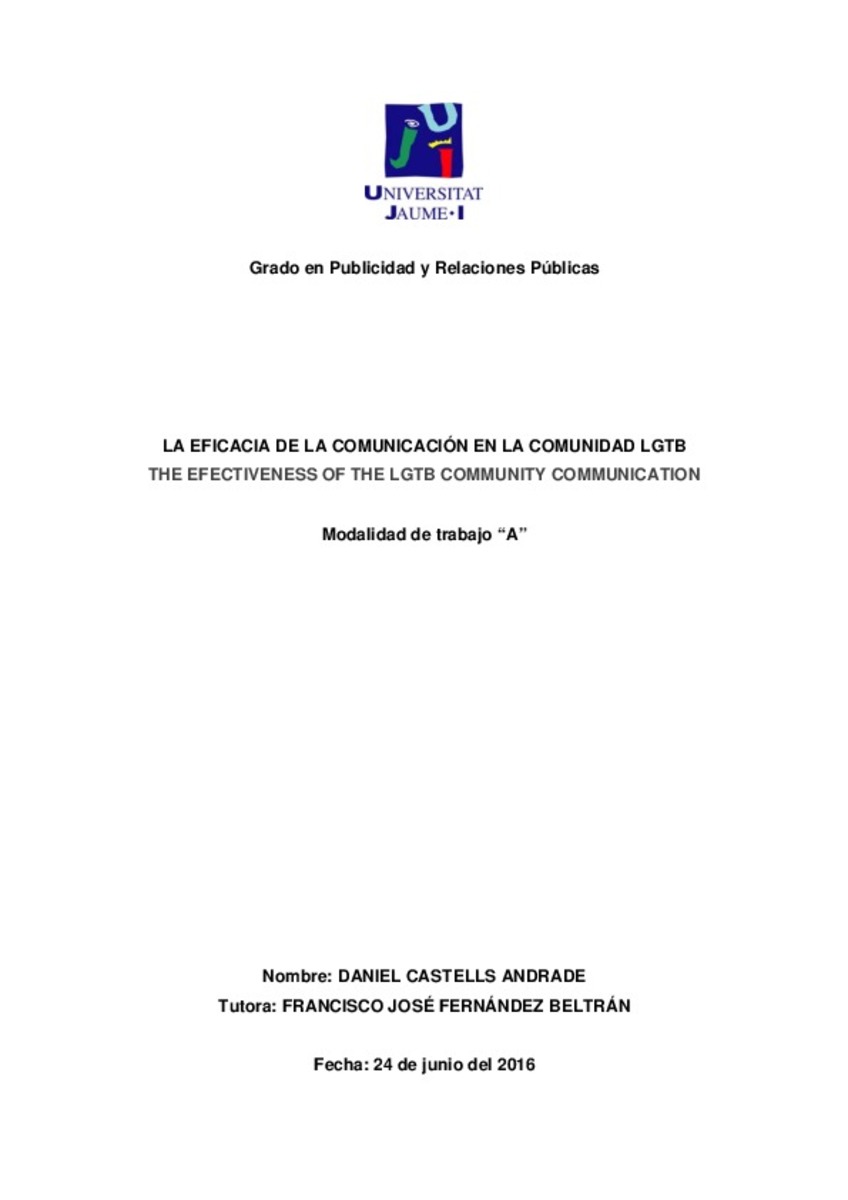Mostrar el registro sencillo del ítem
La eficacia de la comunicación en la comunidad LGTB
| dc.contributor | Fernández Beltrán, Francisco José | |
| dc.contributor.author | Castells Andrade, Daniel Alberto | |
| dc.contributor.other | Universitat Jaume I. Departament de Ciències de la Comunicació | |
| dc.date.accessioned | 2016-11-29T09:16:43Z | |
| dc.date.available | 2016-11-29T09:16:43Z | |
| dc.date.issued | 2016-07-04 | |
| dc.identifier.uri | http://hdl.handle.net/10234/164784 | |
| dc.description | Treball final de Grau en Publicitat i Relacions Públiques. Codi: PU0932. Curs acadèmic 2015-2016 | ca_CA |
| dc.description.abstract | La investigación realizada, ha tenido como objetivo la comprensión de cómo se ha llegado a la situación de igualdad legal y aceptación social de la comunidad LGTB+ actual en España. Así, se ha sido capaz de hacer un estudio cualitativo y cuantitativo para obtener una vía de acción óptima para trabajar dentro de nuestra sociedad y alcanzar una más tolerante. Se ha contextualizado en un marco histórico sobre creencias y actitudes, con lo cual se ha podido definir una investigación basada en puntos de inflexión para el grupo en cuestión, y la comunicación que les acompañaba en esos momentos. Esto ha dado oportunidad para entender cómo funciona la comunicación social y la estrategia utilizada para el movimiento homosexual. Ha permitido el análisis de los insights empleados en diferentes situaciones, y comparar los feedbacks con encuestas de opinión pública y de la misma comunidad que se han realizado para este trabajo. De esta manera, se ha logrado tener una idea más clara de la imagen y reputación que posee el colectivo, y cómo estos resultados obtenidos a lo largo de su lucha, nos sirven hoy en día para mantener el mismo tipo de estrategia o modificarla. En conclusión, la primera posición entre los países más tolerantes, y la plena igualdad legal para la comunidad LGTB+ que tiene España, resulta una afirmación positiva para los integrantes del colectivo del país. Sin embargo, los resultados de las encuestas presentadas, difieren en las estadísticas y estudios realizados previamente a este trabajo. Pero, dado que este estudio fue realizado con un grupo pequeño de sujetos y una investigación de recursos limitados, sólo podemos decir que las conclusiones a las que hemos llegado sobre la situación de igualdad social, apartado de lo que es la Constitución, aún coloca al colectivo en una mejor situación de aceptación e igualdad que en otros países. Que, no obstante, podría realizar una comunicación más eficaz con un cambio de estrategia. | ca_CA |
| dc.description.abstract | The research aimed to understand how it has reached the status of legal equality and social acceptance of the current LGBT+ community in Spain. Thus, it was able to make a qualitative and quantitative study, finding out an optimal course of action to work within our society and achieve a more tolerant one. Contextualized in a historical framework on beliefs and attitudes, an investigation was able to be defined based on turning points for the group in question, and the communication that accompanied them at the time. This gave opportunity to understand how social communication and the strategy used for the homosexual movement works. It allowed the analysis of the applied insights in different situations and the comparison of the feedbacks received from the public and the community opinion polls made for this paper. This way, it was possible to have a clearer idea of the image and reputation that the group owns, and how these results throughout their struggle, are useful for us to either maintain a strategy or modify it. In conclusion, the first position among the most tolerant countries, and full legal equality for LGBT+ community that Spain has, turns to be a positive statement to the members of the group in the country. However, the survey results presented differ in statistics and previous studies to this work. But, since this study was conducted with a small group of subjects and an investigation of limited resources, we can only say that the conclusions we have reached on the situation of social equity, separated from the Constitution concerns, still place the group in a better acceptance and equality status than in other countries. However, they could make a more effective communication with a change of strategy. | ca_CA |
| dc.format.extent | 155 p. | ca_CA |
| dc.format.mimetype | application/pdf | ca_CA |
| dc.language.iso | spa | ca_CA |
| dc.language.iso | eng | ca_CA |
| dc.publisher | Universitat Jaume I | ca_CA |
| dc.rights | Atribución-CompartirIgual 4.0 España | * |
| dc.rights.uri | http://creativecommons.org/licenses/by-sa/4.0/ | * |
| dc.subject | Grau en Publicitat i Relacions Públiques | ca_CA |
| dc.subject | Grado en Publicidad y Relaciones Públicas | ca_CA |
| dc.subject | Bachelor's Degree in Advertising and Public Relations | ca_CA |
| dc.subject | comunidad | ca_CA |
| dc.subject | cultura | ca_CA |
| dc.subject | eficacia | ca_CA |
| dc.subject | insight | ca_CA |
| dc.subject | imagen | ca_CA |
| dc.subject | reputación | ca_CA |
| dc.subject | community | ca_CA |
| dc.subject | culture | ca_CA |
| dc.subject | effectiveness | ca_CA |
| dc.subject | insight | ca_CA |
| dc.subject | image | ca_CA |
| dc.subject | reputation | ca_CA |
| dc.title | La eficacia de la comunicación en la comunidad LGTB | ca_CA |
| dc.type | info:eu-repo/semantics/bachelorThesis | ca_CA |
| dc.educationLevel | Estudios de Grado | ca_CA |
| dc.rights.accessRights | info:eu-repo/semantics/openAccess | ca_CA |
Ficheros en el ítem
Este ítem aparece en la(s) siguiente(s) colección(ones)
-
Grau en Publicitat i Relacions Públiques [612]
PU0932








